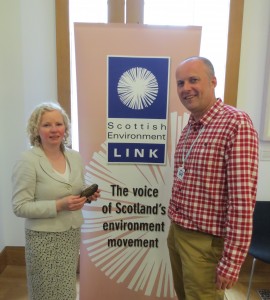Yesterday in Parliament I spoke during Mary Scanlon’s member’s debate on the Freshwater Pearl Mussel after earlier attending an information session in the Parliament hosted by Scottish Environment Link. During the event Dr Peter Cosgrove from Aberdeen University informed us of the work he does with estates and land managers to raise awareness.
The debate was another example of the success of Scottish Environment Link’s Species Champions initiative. As the champion of two species – the Puffin and Lesser Butterfly Orchid – I understand that just putting your name to a threatened species is not enough and we must be active in offering our political support in protecting them.
The enthusiasm of MSPs is being matched by the support we get from the charities and organisations promoting their species. Like other organisations, RSPB and Plantlife have been very helpful in providing me with support to raise issues impacting on the species, from long term challenges around climate change to the impact of the recent storms. The relationships that the initiative has created are helping to raise the profile of Scotland’s biodiversity.
The freshwater pearl mussel is one of the most critically endangered molluscs in the world and as such is worthy of championing. In the recent Aquaculture and Fisheries debate my colleague Graeme Pearson spoke about illegal cockle fishing and this bill is taking measures to improve detention and prosecution. It is not enough to simply pass the legislation that defines the ban for pearl or indeed cockle fishing, we must make sure that the enforcement measure are robust enough to deal with the issue of any illegal fishing that may take place.
The species is protected by the Wildlife and Countryside Act but this has not stopped reports of illegal damage to pearl mussels taking place each year. In the past 5 years the police and National Wildlife Crime Unit have recorded at least 10 incidents per year and estimates put the number of suspected crimes as high as 30 annually. The reality is that the detection and thus enforcement of illegal pearl fishing is extremely difficult as offences take place in often remote areas of the country.
Admired and coveted around the world, we have a responsibility to address the decline and secure their place in Scotland’s future. I am pleased that Mary will continue to champion, not just their survival, but hopefully oversee their ability to thrive again.
A full copy of my speech can be found here: http://www.scottish.parliament.uk/parliamentarybusiness/28862.aspx?r=8131&mode=html#iob_73811

